Youth suicide NSW: Survivors share their stories and how to seek help
Survivors of attempted youth suicide have opened up on their journey finding the light in darkness as alarming new statistics show a spike in the number of suicidal calls to the Kids Helpline during the pandemic.
NSW
Don't miss out on the headlines from NSW. Followed categories will be added to My News.
Survivors of attempted youth suicide have opened up on their journey finding the light in darkness as alarming new statistics show a spike in the number of suicidal calls to the Kids Helpline.
The new figures obtained by The Daily Telegraph show a surge in overall calls to the helpline during the pandemic.
Demand for youth counselling across phone, webchat and email services rose 28 per cent in NSW in the six months to August.
Most concerningly, the number of children referred to paramedics, child safety or police for suicide attempts increased 45 per cent on 2019.
In total, more than 80,000 children tried to contact the helpline – averaging 500 contacts per day.
RELATED: In-school addiction driving kids towards suicide
Kids Helpline counselling supervisor Leo Hede said many children highlighted feelings of loneliness and uncertainty about the pandemic during sessions.
“We saw a big spikes in contacts at the start of the pandemic, with kids expressing a lot of anxiety and not knowing what was going on,” he said.If you are struggling, contact the Kids Helpline on 1800 551 800 or Lifeline on 13 11 14.
Paraplegic spreads hope after near-death experience
Matt Caruana was 16 when he tried to end his own life.
Though his story is difficult for many people to hear, the now 20-year-old thinks it’s important to see the “ugly side” that no one speaks about when it comes to suicide, but that he is proof that there is hope on the other side.
“I constantly questioned my self worth, self image and whether I even brought value to the world and would people even care if I wasn’t alive,” he said.
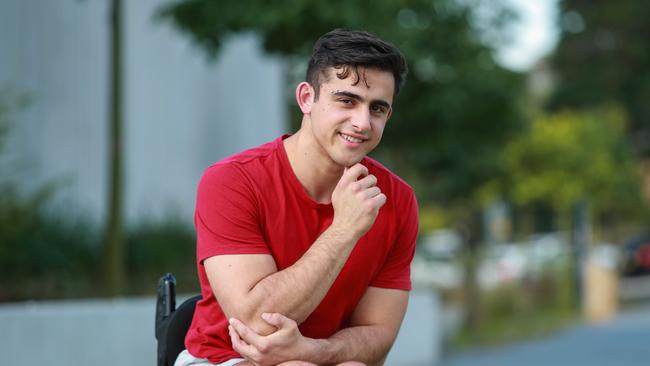
“This caused major depression within myself and after years of dwelling on these questions, I felt even more worthless and struggled to see a reason to go on.”
Consumed by these thoughts, it eventually sent the young teen down a path of destruction, as he fell into drug abuse, depression and anxiety at the age of 13.
“I started experimenting with drugs like cocaine and fell into addiction and then dealing to keep it up,” he said. “It gave me the feeling of stability, and as short lived as it was, I would chase that high feeling.”
But on January 9, 2016 and after three years of battling his darkest thoughts alone, he believed he no longer had anything to live for.
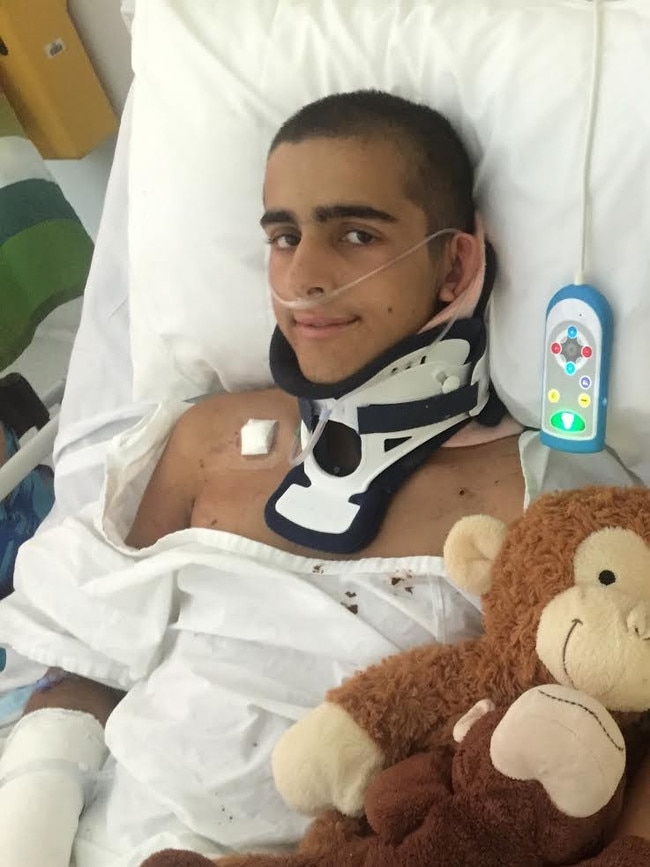
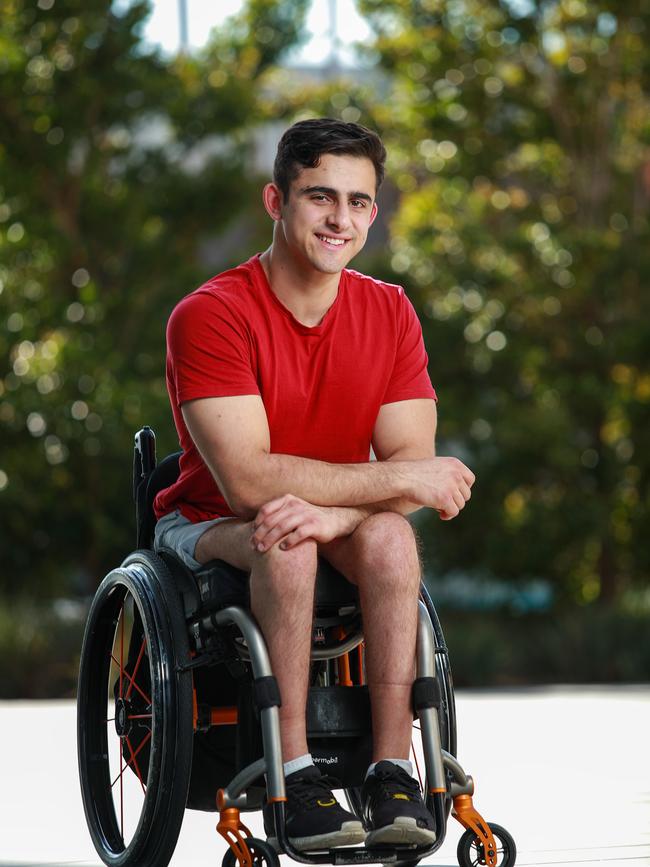
Remarkably he survived, but had suffered irreversible damage which would leave him paraplegic.
But it was a chance encounter with a stranger only a week before he was due to be discharged from hospital, that would forever change the teenager’s life.
“On the train back to hospital, a man stepped on and began staring before asking what had happened to me,” he said.
“It was a question he’d heard countless times before, but this time, something was different.
“It was a mixture of how excited I was about the piercing and how abrupt this guy was, but for the first time, I just said I’d attempted suicide.”
Since overcoming various mental health challenges, Mr Caruana has shared his story in schools, universities and corporate events, raising awareness of the devastating impact suicide can have on families and communities and campaigning for better mental health care.
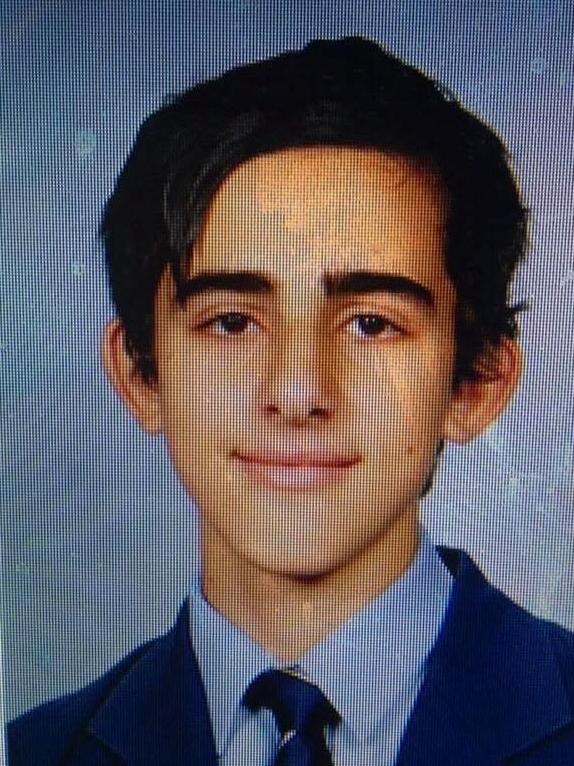
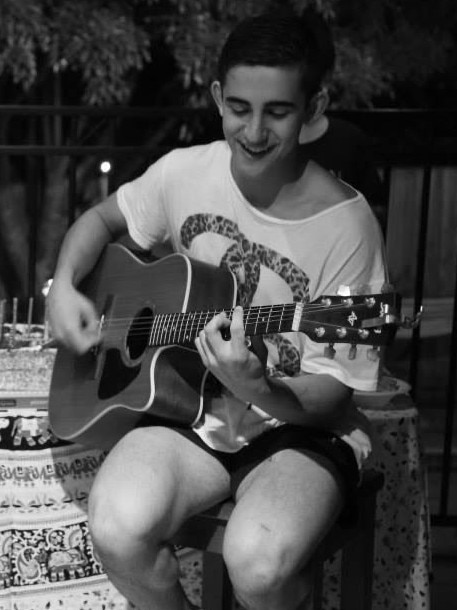
The work he does is centred on spreading the message that hope is real and people who have been suicidal can and do recover.
Having spoken to more than 5000 students, he believes there needs to be more awareness around the help and services available to those who are struggling.
“Counsellors do add value, but most of the time young people are so uncomfortable talking about things,” he said.
“So we need to let them know there are call and text hotlines out there which can be anonymous and they‘re 24 hours available, because I never knew that.
“I also believe teachers, who are the leaders, need to be trained appropriately so that they know how to approach these matters and change their overall attitude.”
SUICIDE SURVIVOR TELLS KIDS TO “KEEP FIGHTING”
Nineteen-year-old nursing student and disability carer Bridget O’Connell says the kindness of one person in reaching out in her darkest moments “changed her life completely” and gave her the courage to get help after two suicide attempts. Now, she is on a mission to inspire young people who are suffering to “keep fighting” and make “one big change in their life” to turn things around.
Growing up with six siblings in Sydney’s northwest and having lost her father at the tender age of four, life was never straightforward for the young Carlingford resident.
A passionate sportswoman and high achiever, she pursued cricket and hockey competitively from a young age.
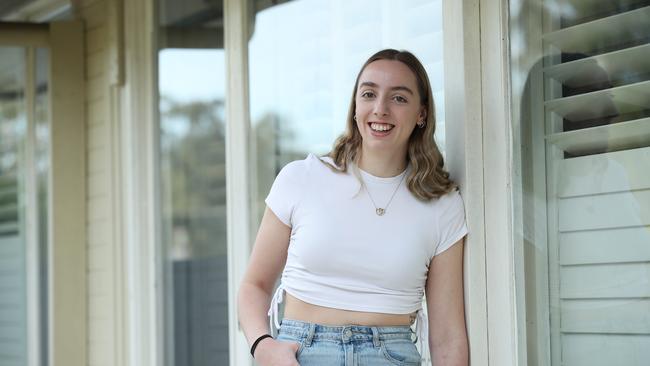
But the constant weight of responsibility, “unrealistic pressure” to perform in all areas of her life and stigma around getting help drove her into a dark place.
“I started seeing a counsellor at age 13 because I had so much pressure from my mum to do everything I could at school and in sport and other areas of my life,” she said.
“Early on I told my mum I wanted to see a counsellor, but she said, ‘you don’t need that, just be happy.’”
As the teen struggled to manage her difficult emotions alone, she started binge drinking and self-harming as a coping mechanism.
When she landed a hockey scholarship in America in 2016, it should have been the happiest moment of her life. Instead, consumed by depression, she turned down the offer.
It was not until years later – after trips in and out of mental health units and a misdiagnosis of depression and borderline personality disorder – that a psychiatrist confirmed she had bipolar.
“I would constantly be up and down with periods of highs and lows. It was a rollercoaster.”
She remembers languishing outside the school counsellor’s office for hours on end, unable to cope with daily life.
“They said to me, ‘you can’t do this, you need to go to hospital.’”
By the age of 18, the pain had become too much and she had made two attempts on her life.
“The last thing I remember is yelling to the ambos ‘I’m so sorry, you shouldn’t be doing. The next thing I know, I’m in Westmead Hospital with people who were dying.
“I remember feeling like it should’ve been a wake-up call, but I was so deep in the depths of darkness, I couldn’t see the light.”
After a year and a half under the full time care of her mother, it was the kindness of another suicide survivor, 20-year-old Matt Caruana, that turned her life around.
“He told me that he saw something in me I couldn’t see yet … He gave me hope and became my rock.”
Matt’s empathy helped Bridget confront her difficult emotions and find solace in knowing she was not alone. He also inspired her to get professional help.
“Matt always said to me ‘what would you do with your second chance at life?’”
“He always reminded me whatever I feel is valid. That there was nothing right or wrong. Then I started to see a psychologist. She’s been incredible and a big part of my recovery.”
Today, Bridget says she is the happiest she has ever been as she studies nursing at TAFE and works as a disability support carer.
“In recent months, my life has really changed. I’m finally on the right medication and I’ve started TAFE and working as a support worker in disability and I love it.”
Bridget is now telling her story to encourage young people who are struggling to confront their difficult emotions. Reaching out for help can change your life, she says.
“All that is required is to make one big change to set your life in the right direction. Matt was the change I needed, but I also started going to the gym and got a new job.
“Young people need to keep fighting. There are so many people on the earth and there will always be someone that can help.”
‘TALK TO SOMEONE’: SURVIVOR REVEALS LIFE-CHANGING MOMENT
21-year-old psychology student Bella Cini is urging parents to chat with their teenagers about suicide and kids to “talk to someone” after a seven-year battle with depression saw her almost lose her life to suicide at age 17. Today, studying psychology and travelling to schools across NSW to advocate for youth mental health, she couldn’t be happier to be alive.
The young mental health advocate was on a holiday in America with her family, age 14, when she first felt the black cloud of depression take hold.
She remembers watching her family enjoying their holiday when an overwhelming feeling of darkness blindsided her.
“One day I woke up and the feeling never went away,” she said.
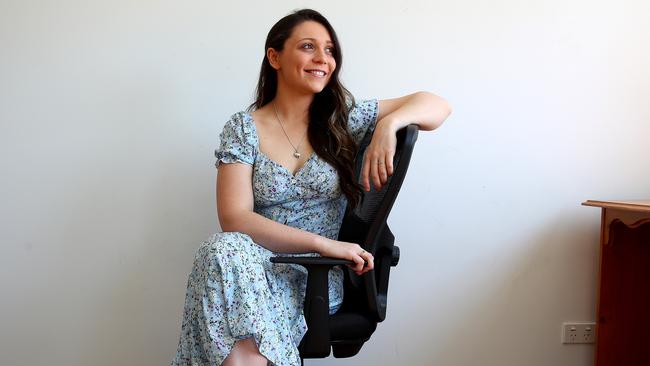
In the years that followed, Bella could not shake the feelings of darkness. As a student at a Catholic all-girls school in Sydney’s eastern suburbs, she would go on to grapple with the pressures of high school and keeping up appearances.
At age 16, life took a turn for the worst when her parent’s relationship started to deteriorate. Caught between two infighting adults and afraid of being a “burden,” she was too ashamed to reach out for help. Within months, she would start to self-harm as “an escape.”
When her father left the family in 2016, she hit rock bottom.
With no fight left, she would go on to make an attempt on her own life.
“It was a big trigger on top of the depression, I felt abandoned and was grieving the relationship with my dad,” she said.
Months later, when she finally opened up about her experience to a schoolteacher, her life completely turned around.
“She listened and then sent me to Headspace, where I started to have regular appointments. Then I found a psychologist and went on medication and really committed to getting better.”
Today, Bella recounts her darkest days as a story of hope as she enters her final year of a psychology degree. In her spare time, she talks to school kids about her mental health journey as part of the Batyr program.
“Having gone through depression as a young person, I wanted to be the person I needed at that time,” she says.
The young advocate says her story is a powerful reminder of the importance of getting help before it is too late.
Mental illness – like any other illness – should be treated without delay and without shame, she says.
“Just talk to someone if you’re struggling. It seems obvious and while in the moment it might feel impossible, it will make you feel better.
“There is so much help out there and I hope that kids can see that. They deserve the help and everyone deserves to feel happy and not struggle.”
Parents also have a big role to play in preventing suicide by having candid discussions with their children, she says.
“It’s not talked about enough in households. In my family it wasn’t, but it is something you can have positive conversation about. It’s amazing the power a conversation can have.”
If you need help, contact Lifeline on 13 11 14 or Kids Helpline 1800 55 1800
